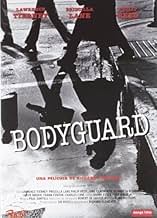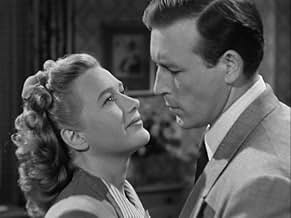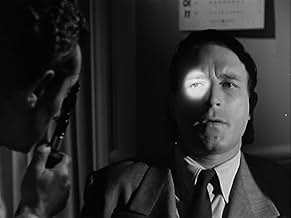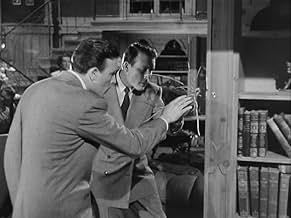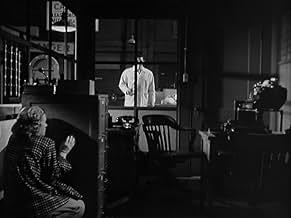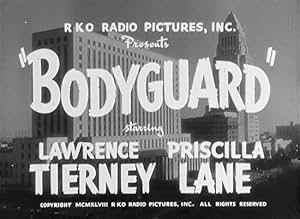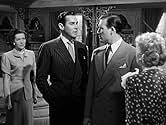IMDb-BEWERTUNG
6,5/10
1330
IHRE BEWERTUNG
Füge eine Handlung in deiner Sprache hinzuAfter being fired for insubordination, homicide detective Mike Carter is hired as bodyguard by the owner of a local meat-packing plant where a meat inspector has been murdered.After being fired for insubordination, homicide detective Mike Carter is hired as bodyguard by the owner of a local meat-packing plant where a meat inspector has been murdered.After being fired for insubordination, homicide detective Mike Carter is hired as bodyguard by the owner of a local meat-packing plant where a meat inspector has been murdered.
Erville Alderson
- Adam Stone
- (Nicht genannt)
Bobby Barber
- Little Man in Street
- (Nicht genannt)
Charles Bedell
- Cop
- (Nicht genannt)
Claire Carleton
- Zinnia
- (Nicht genannt)
Russ Clark
- Cop
- (Nicht genannt)
Marcelle Corday
- Madalena
- (Nicht genannt)
David Cota
- Pachuco
- (Nicht genannt)
Joe Devlin
- Detective Sgt. Burch
- (Nicht genannt)
Dante DiPaolo
- Young Man in Police Station
- (Nicht genannt)
Empfohlene Bewertungen
Made in 1948, Bodyguard' is the first of several effective and taut noir B-thrillers made by Richard Fleischer at the start of his career. Follow Me Quietly' and Clay Pigeon' came next, (both 1949) and finally, with increasing assurance, Armored Car Robbery' (1950) and The Narrow Margin (1952). There's a comparison to be made here between Fleischer's work and that of his contemporary Anthony Mann. Starting with Desperate' (1947) Mann founded his own directorial reputation on several effective B-thrillers around the same time, work now highly regarded among fans. Fleischer's films, though sharing many of the same qualities, are relatively less well known and await discovery. While in the 50's Mann went on to direct a great series of Westerns with James Stewart such as Naked Spur' and then to the quality epic El Cid', Fleischer's later career was workman-like, entertaining, if generally unexceptional.
Bodyguard' apparently exists in two version. There's a 75 minute director's cut' out there somewhere. The one discussed here is the original 62 minute release. I suspect that most of those missing minutes might have disappeared from the potentially gruesome meat factory finale. These are scenes which feel slightly abbreviated, but generally continuity and plot seem unimpaired from any trimming. As the then unknown Robert Altman co-wrote the screen play, it would be interesting to see what has been excised.
At the heat of the film is ex-homicide detective Mike Carter, played with stoney-eyed, rigid-backed conviction by Lawrence Tierney. The plot is the old one of the hero framed by the real villains to throw the law off their scent, and of his attempts to clear his name while on the run. Tierney (who also appeared in Reservoir Dogs' (1992) - no doubt chosen by Tarantino because of his minor noir-iconic status) had just appeared in one of the great films of the genre, Wise's Born to Kill/Lady of Deceit' (1947) when he was cast next in Bodyguard'. A legendary real life tough guy, his brawling presence dominates proceedings. As an actor he had the ability to project a dead calm, scowling brutalness - ideal for noir, a characteristic he showed beyond doubt as a superb Dillinger in the movie of the same name (1945). In the present film he is a cop at the outset, but soon loses his job after fighting with his boss - in effect turning into a private detective. Although he is hired as a `bodyguard', Carter's semi-official investigative powers, his struggle to clear his name after he is framed, as well as the pervading air of conspiracy and persecution place this clearly in noir territory. Ultimately Carter ends up protecting his own body from the manhunt and killers, rather than that of his client.
The noir style frequently brought out the best in directors of all abilities. The shooting requirements of the genre (shadow, cheap sets, anonymous location and so on) made a virtue out of low budgets. Fleischer's tough film is punctuated with some particularly effective scenes. At one point Carter is led by evidence to an opticians office. Himself seated in an examination chair for a check up, Carter quizzes the nervous eye doctor. As he questions his suspect, Carter's eye fills the screen in dramatic close up, his iris contracting under the light. The view is disconcerting as it reveals the ex-cop under a microscope, as it were, while the emotionless hard-boiled dialogue continues over the image. We are as close to the man as we can get, but his language reveals nothing.
A would-be attacker is reflected in a mirror, and a swift struggle ensues. Carter brutally subdues both men, then both he and girlfriend bluff their way past an arriving policeman to escape. There's tension, pacing and originality of staging here, enough to do justice to a bigger crime picture. Mirrors have already played a part in the plot: earlier, with calm professionalism, Carter deduced why an assassin's bullet missed Gene Dyson. The killer, he decides, had mistaken the old lady's reflection for the real thing. Later in the plot, the near perfect sight of the murdered meat inspector is the fact upon which the case ultimately turns. The equation of seeing' with comprehension' - a common conceit in noir - falls into place discreetly, without strain.
The biggest weakness of the film is the relationship between Carter and his girlfriend. Too often a compliant and docile investigative companion, and too quick to put up with the rigours involved, she lacks strength and individuality. When Carter rushes to her assistance at the end of the film (a setting reminiscent of the meat-packing plant robbery of Gun Crazy' filmed two years later) one feels she has served her only necessary purpose apart from lazily filling out his home life. With the luxury of a longer running time, she might have added another dimension to the hero. She is reduced to a plot device, a noir damsel in distress.
Bodyguard' is well worth seeking out among more obscure noirs. There are better films but the non-nonsense strengths of this production, as well as the pleasure of seeing Tierney playing a star role make it enjoyable.
Bodyguard' apparently exists in two version. There's a 75 minute director's cut' out there somewhere. The one discussed here is the original 62 minute release. I suspect that most of those missing minutes might have disappeared from the potentially gruesome meat factory finale. These are scenes which feel slightly abbreviated, but generally continuity and plot seem unimpaired from any trimming. As the then unknown Robert Altman co-wrote the screen play, it would be interesting to see what has been excised.
At the heat of the film is ex-homicide detective Mike Carter, played with stoney-eyed, rigid-backed conviction by Lawrence Tierney. The plot is the old one of the hero framed by the real villains to throw the law off their scent, and of his attempts to clear his name while on the run. Tierney (who also appeared in Reservoir Dogs' (1992) - no doubt chosen by Tarantino because of his minor noir-iconic status) had just appeared in one of the great films of the genre, Wise's Born to Kill/Lady of Deceit' (1947) when he was cast next in Bodyguard'. A legendary real life tough guy, his brawling presence dominates proceedings. As an actor he had the ability to project a dead calm, scowling brutalness - ideal for noir, a characteristic he showed beyond doubt as a superb Dillinger in the movie of the same name (1945). In the present film he is a cop at the outset, but soon loses his job after fighting with his boss - in effect turning into a private detective. Although he is hired as a `bodyguard', Carter's semi-official investigative powers, his struggle to clear his name after he is framed, as well as the pervading air of conspiracy and persecution place this clearly in noir territory. Ultimately Carter ends up protecting his own body from the manhunt and killers, rather than that of his client.
The noir style frequently brought out the best in directors of all abilities. The shooting requirements of the genre (shadow, cheap sets, anonymous location and so on) made a virtue out of low budgets. Fleischer's tough film is punctuated with some particularly effective scenes. At one point Carter is led by evidence to an opticians office. Himself seated in an examination chair for a check up, Carter quizzes the nervous eye doctor. As he questions his suspect, Carter's eye fills the screen in dramatic close up, his iris contracting under the light. The view is disconcerting as it reveals the ex-cop under a microscope, as it were, while the emotionless hard-boiled dialogue continues over the image. We are as close to the man as we can get, but his language reveals nothing.
A would-be attacker is reflected in a mirror, and a swift struggle ensues. Carter brutally subdues both men, then both he and girlfriend bluff their way past an arriving policeman to escape. There's tension, pacing and originality of staging here, enough to do justice to a bigger crime picture. Mirrors have already played a part in the plot: earlier, with calm professionalism, Carter deduced why an assassin's bullet missed Gene Dyson. The killer, he decides, had mistaken the old lady's reflection for the real thing. Later in the plot, the near perfect sight of the murdered meat inspector is the fact upon which the case ultimately turns. The equation of seeing' with comprehension' - a common conceit in noir - falls into place discreetly, without strain.
The biggest weakness of the film is the relationship between Carter and his girlfriend. Too often a compliant and docile investigative companion, and too quick to put up with the rigours involved, she lacks strength and individuality. When Carter rushes to her assistance at the end of the film (a setting reminiscent of the meat-packing plant robbery of Gun Crazy' filmed two years later) one feels she has served her only necessary purpose apart from lazily filling out his home life. With the luxury of a longer running time, she might have added another dimension to the hero. She is reduced to a plot device, a noir damsel in distress.
Bodyguard' is well worth seeking out among more obscure noirs. There are better films but the non-nonsense strengths of this production, as well as the pleasure of seeing Tierney playing a star role make it enjoyable.
Up until a few weeks ago, I only knew cult 40s tough guy Lawrence Tierney from his role in Tarantino's RESERVOIR DOGS (1991); recently, however, I managed to watch his 2 vehicles released on DVD by Warners as part of their "Film Noir Collection Vol. 2", namely DILLINGER (1945) and BORN TO KILL (1947). This Richard Fleischer film, then, would be my third from Tierney's short period of glory.
Actually, the actor is the best thing about the whole movie - whose story, amazingly, was co-written by a very young Robert Altman! - as it's certainly a minor noir, albeit an enjoyable one; indeed, Tierney's cynical, no-nonsense attitude (reminiscent of Bogart, Mitchum and Robert Ryan) provides a good deal of amusement throughout. Still, the plot - a discredited cop uncovering corruption in a meat-packing company, when appointed to protect the elderly female proprietor - is nothing special and also kind of dreary; besides, the jovial personality of leading lady Priscilla Lane is as much unsuited to Tierney's hard-boiled façade as she is to the inherent bleakness of the genre!
Actually, the actor is the best thing about the whole movie - whose story, amazingly, was co-written by a very young Robert Altman! - as it's certainly a minor noir, albeit an enjoyable one; indeed, Tierney's cynical, no-nonsense attitude (reminiscent of Bogart, Mitchum and Robert Ryan) provides a good deal of amusement throughout. Still, the plot - a discredited cop uncovering corruption in a meat-packing company, when appointed to protect the elderly female proprietor - is nothing special and also kind of dreary; besides, the jovial personality of leading lady Priscilla Lane is as much unsuited to Tierney's hard-boiled façade as she is to the inherent bleakness of the genre!
Slick,speedy 'B' thriller with on(and off!)screen tough guy Lawrence Tierney as a suspended cop eventually agreeing to do some work on the side as a bodyguard for a wealthy family.The plot is inevitably fairly routine,but there are some well-handled scenes,and it remains watchable.One fact not usually mentioned;this was the final screen appearance of Priscilla Lane(best known for her roles in WARNER BROS. classics in the 30's,and Hitchcock's SABOTEUR);she was still far too young and surely had more years ahead as a screen actress.Her performance in her screen bow is OK,like Tierney and the rest of the cast.Director Richard Flesicher had better 'B' efforts up his sleeve though(THE NARROW MARGIN),a few years later.
A consensus seems to exist among commentators on Richard Fleischer's Bodyguard, based on a story by the young Robert Altman. The consensus is that, as it stands, it fails to satisfy; the background to this verdict is that somewhere there is or at least was a longer cut of the picture that probably would have been, if not a little masterpiece of film noir, a less nettlesome movie.
Feral Lawrence Tierney, a detective fired from the force for insubordination, gets offered the job of bodyguard to a old woman whose wealth comes from the meat-packing industry. At first reluctant, he accepts when shots shatter a mirror in the woman's home. Following her on a nocturnal errand, he's coshed on the head and comes to in his car parked on railway tracks; riding shotgun is the police officer who fired him, dead. Now the prime suspect, he lams up.
Assisting him in his efforts to clear himself is Priscilla Lane, his mole in police headquarters. (They devise a curious means of communication. She reads the files onto 78s and delivers them to a record store where he listens to them in a booth.) It turns out that his murdered superior investigated the death of a meat inspector at one of the plants owned by his employer....
What remains of the movie is directed with pace and even some style by Richard Fleischer (The Narrow Margin, Armored Car Robbery, The Boston Strangler; he showed a lot of sass in his early days, before he ossified into a hack.) But what we lack compromises what we have. The 13 minutes excised from the movie somewhere along the line no doubt patch up the holes in the leaky plot like, who knew Tierney was off to the optometrist's office and set up the ambush?
A fuller version would probably make, as has been remarked, for a more grisly final confrontation, a la Upton Sinclair's The Jungle, in the meat-processing plant; in the print in common circulation, it abruptly fizzles out. Certainly, that's the lack most keenly felt. What with the meat saws whining and the meat grinders rumbling, surely Fleischer did not conclude the story with the malefactor hurling an empty pistol, bootlessly, at Tierney to be followed, almost instantly, with Tierney and Lane leaving on their honeymoon. Somewhere out there, a few links of blood sausage are missing.
Feral Lawrence Tierney, a detective fired from the force for insubordination, gets offered the job of bodyguard to a old woman whose wealth comes from the meat-packing industry. At first reluctant, he accepts when shots shatter a mirror in the woman's home. Following her on a nocturnal errand, he's coshed on the head and comes to in his car parked on railway tracks; riding shotgun is the police officer who fired him, dead. Now the prime suspect, he lams up.
Assisting him in his efforts to clear himself is Priscilla Lane, his mole in police headquarters. (They devise a curious means of communication. She reads the files onto 78s and delivers them to a record store where he listens to them in a booth.) It turns out that his murdered superior investigated the death of a meat inspector at one of the plants owned by his employer....
What remains of the movie is directed with pace and even some style by Richard Fleischer (The Narrow Margin, Armored Car Robbery, The Boston Strangler; he showed a lot of sass in his early days, before he ossified into a hack.) But what we lack compromises what we have. The 13 minutes excised from the movie somewhere along the line no doubt patch up the holes in the leaky plot like, who knew Tierney was off to the optometrist's office and set up the ambush?
A fuller version would probably make, as has been remarked, for a more grisly final confrontation, a la Upton Sinclair's The Jungle, in the meat-processing plant; in the print in common circulation, it abruptly fizzles out. Certainly, that's the lack most keenly felt. What with the meat saws whining and the meat grinders rumbling, surely Fleischer did not conclude the story with the malefactor hurling an empty pistol, bootlessly, at Tierney to be followed, almost instantly, with Tierney and Lane leaving on their honeymoon. Somewhere out there, a few links of blood sausage are missing.
Id like to think Altman (24 at the time) wrote that Mike Carter listening to the Exposition Lady on the Many Records scene himself (it slaps, especially the bit where the woman talks to the person listening in), plus that amusing set piece at the eye doctor's office.
Bodyguard is somewhat Meat and Potatoes 'Some-Mug-Set-Me-Up-Ill-Find-Out-Who-Can't-Go-To-the-Cops-Whaddaya-Crazy piece of pulp, elevated by some decent if occasionally uncanny direction from Fleischer (watch for those EXTREME close-ups and quick zoom-ins - say, maybe this did influence Altman after all) and in particular Tierney, who plays this ex-homicide detective turned bodyguard turned Man Solving His Own Frame-Job with some quick skills, a bit of wit and a number of swift punches and choke-holds (not to mention disguises, re that Eye doctor scene). Everyone else here is more or less serviceable, but his presence single-handedly makes it compelling; in another world, he couldve been a more hard-boiled Dick Tracy.
I'm not sure if it would be quite as memorable without its star and a few above average twists (and one I called halfway through... Yeah, I wasn't quick on the draw this time). A true blue B movie that goes by like reading a crumpled paperback on a commute.
(Really, much as I kid, the Altman part is a bit of a foot-note, one of four credited writers, and he didn't go back to movies gor another nine years)
Bodyguard is somewhat Meat and Potatoes 'Some-Mug-Set-Me-Up-Ill-Find-Out-Who-Can't-Go-To-the-Cops-Whaddaya-Crazy piece of pulp, elevated by some decent if occasionally uncanny direction from Fleischer (watch for those EXTREME close-ups and quick zoom-ins - say, maybe this did influence Altman after all) and in particular Tierney, who plays this ex-homicide detective turned bodyguard turned Man Solving His Own Frame-Job with some quick skills, a bit of wit and a number of swift punches and choke-holds (not to mention disguises, re that Eye doctor scene). Everyone else here is more or less serviceable, but his presence single-handedly makes it compelling; in another world, he couldve been a more hard-boiled Dick Tracy.
I'm not sure if it would be quite as memorable without its star and a few above average twists (and one I called halfway through... Yeah, I wasn't quick on the draw this time). A true blue B movie that goes by like reading a crumpled paperback on a commute.
(Really, much as I kid, the Altman part is a bit of a foot-note, one of four credited writers, and he didn't go back to movies gor another nine years)
Wusstest du schon
- WissenswertesFinal film of Priscilla Lane.
- PatzerMike Carter jumps out of a car just before a train hits it. The front of the engine should read Santa Fe, but the image was reversed and says " EF ATNAS"
- Zitate
Fenton: You in the meat business?
Mike Carter: In a way. I keep the meat warm. I'm a bodyguard.
- VerbindungenReferences Vom Winde verweht (1939)
Top-Auswahl
Melde dich zum Bewerten an und greife auf die Watchlist für personalisierte Empfehlungen zu.
- How long is Bodyguard?Powered by Alexa
Details
- Erscheinungsdatum
- Herkunftsland
- Sprache
- Auch bekannt als
- Polisalarm
- Drehorte
- Produktionsfirma
- Weitere beteiligte Unternehmen bei IMDbPro anzeigen
- Laufzeit1 Stunde 2 Minuten
- Farbe
- Seitenverhältnis
- 1.37 : 1
Zu dieser Seite beitragen
Bearbeitung vorschlagen oder fehlenden Inhalt hinzufügen


